Waste Management, Biogas Potential and Challenges in Accra, Ghana
VerifiedAdded on 2023/06/13
|61
|18285
|209
Report
AI Summary
This report provides a comprehensive analysis of waste management challenges in Accra, Ghana, focusing on the potential for biogas production as a sustainable energy source. It highlights the problems stemming from rapid urbanization, inadequate waste collection, and ineffective sewage treatment. The study explores the lack of resources, weak institutional capacity, and negative public attitudes that hinder effective waste management. It further discusses the rationale for biogas as a clean energy alternative, addressing issues related to indoor air pollution from traditional fuel sources. The report investigates various themes related to stakeholder communication, obligations, and the purpose of waste management activities, ultimately offering recommendations for improved education, infrastructure, and policy implementation to promote sustainable waste management practices in Accra.
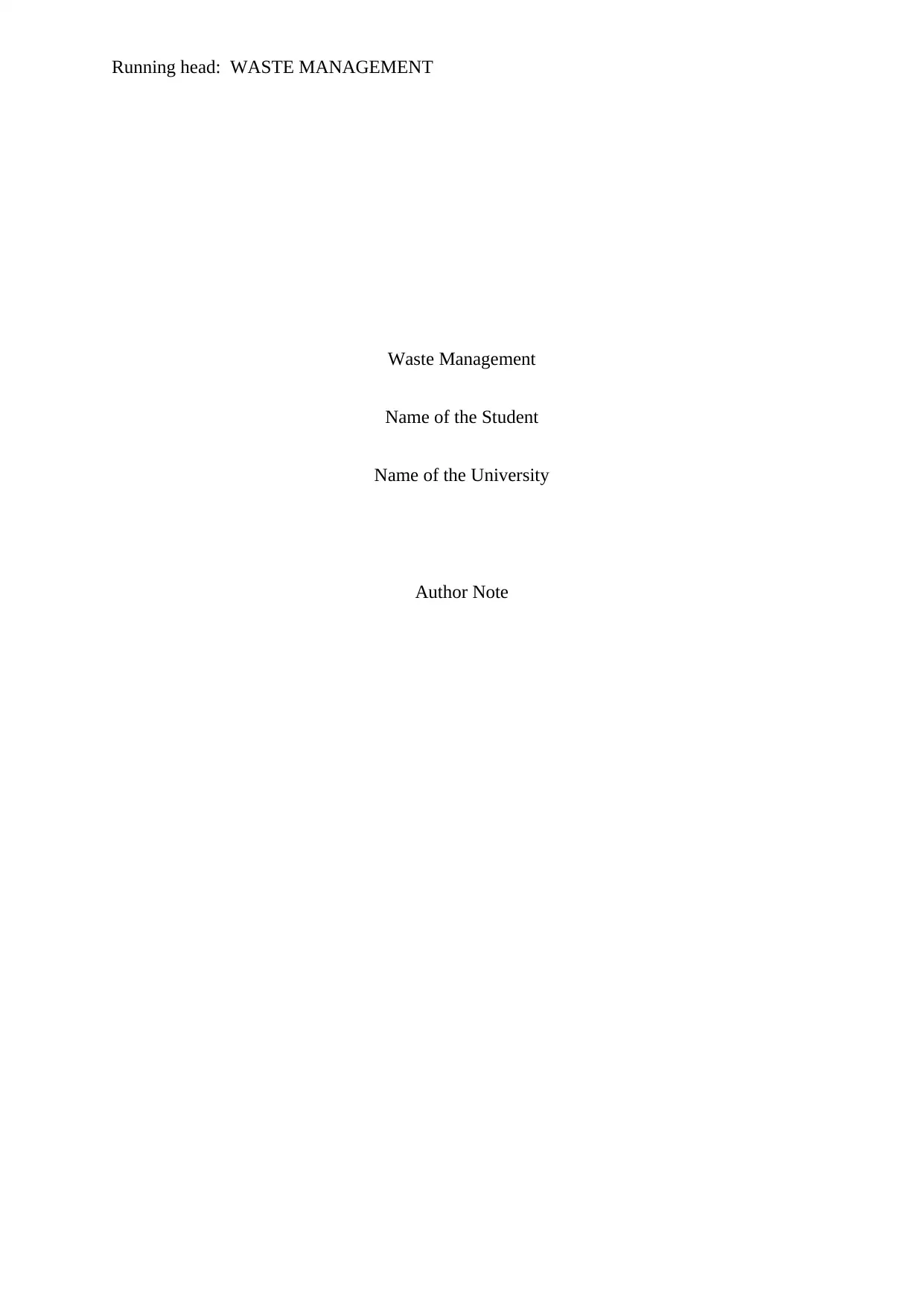
Running head: WASTE MANAGEMENT
Waste Management
Name of the Student
Name of the University
Author Note
Waste Management
Name of the Student
Name of the University
Author Note
Paraphrase This Document
Need a fresh take? Get an instant paraphrase of this document with our AI Paraphraser
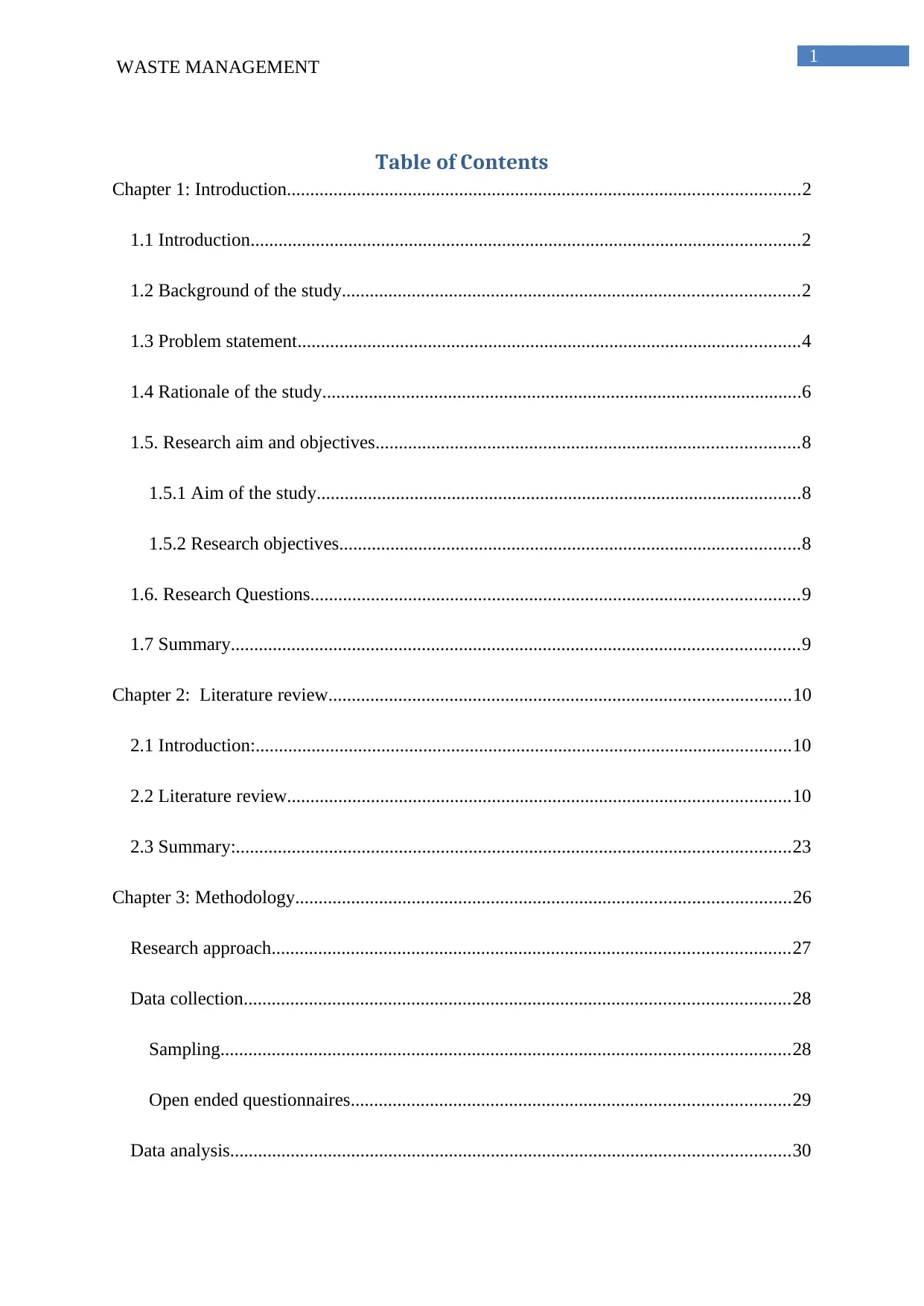
1
WASTE MANAGEMENT
Table of Contents
Chapter 1: Introduction..............................................................................................................2
1.1 Introduction......................................................................................................................2
1.2 Background of the study..................................................................................................2
1.3 Problem statement............................................................................................................4
1.4 Rationale of the study.......................................................................................................6
1.5. Research aim and objectives...........................................................................................8
1.5.1 Aim of the study........................................................................................................8
1.5.2 Research objectives...................................................................................................8
1.6. Research Questions.........................................................................................................9
1.7 Summary..........................................................................................................................9
Chapter 2: Literature review...................................................................................................10
2.1 Introduction:...................................................................................................................10
2.2 Literature review............................................................................................................10
2.3 Summary:.......................................................................................................................23
Chapter 3: Methodology..........................................................................................................26
Research approach...............................................................................................................27
Data collection.....................................................................................................................28
Sampling..........................................................................................................................28
Open ended questionnaires..............................................................................................29
Data analysis........................................................................................................................30
WASTE MANAGEMENT
Table of Contents
Chapter 1: Introduction..............................................................................................................2
1.1 Introduction......................................................................................................................2
1.2 Background of the study..................................................................................................2
1.3 Problem statement............................................................................................................4
1.4 Rationale of the study.......................................................................................................6
1.5. Research aim and objectives...........................................................................................8
1.5.1 Aim of the study........................................................................................................8
1.5.2 Research objectives...................................................................................................8
1.6. Research Questions.........................................................................................................9
1.7 Summary..........................................................................................................................9
Chapter 2: Literature review...................................................................................................10
2.1 Introduction:...................................................................................................................10
2.2 Literature review............................................................................................................10
2.3 Summary:.......................................................................................................................23
Chapter 3: Methodology..........................................................................................................26
Research approach...............................................................................................................27
Data collection.....................................................................................................................28
Sampling..........................................................................................................................28
Open ended questionnaires..............................................................................................29
Data analysis........................................................................................................................30
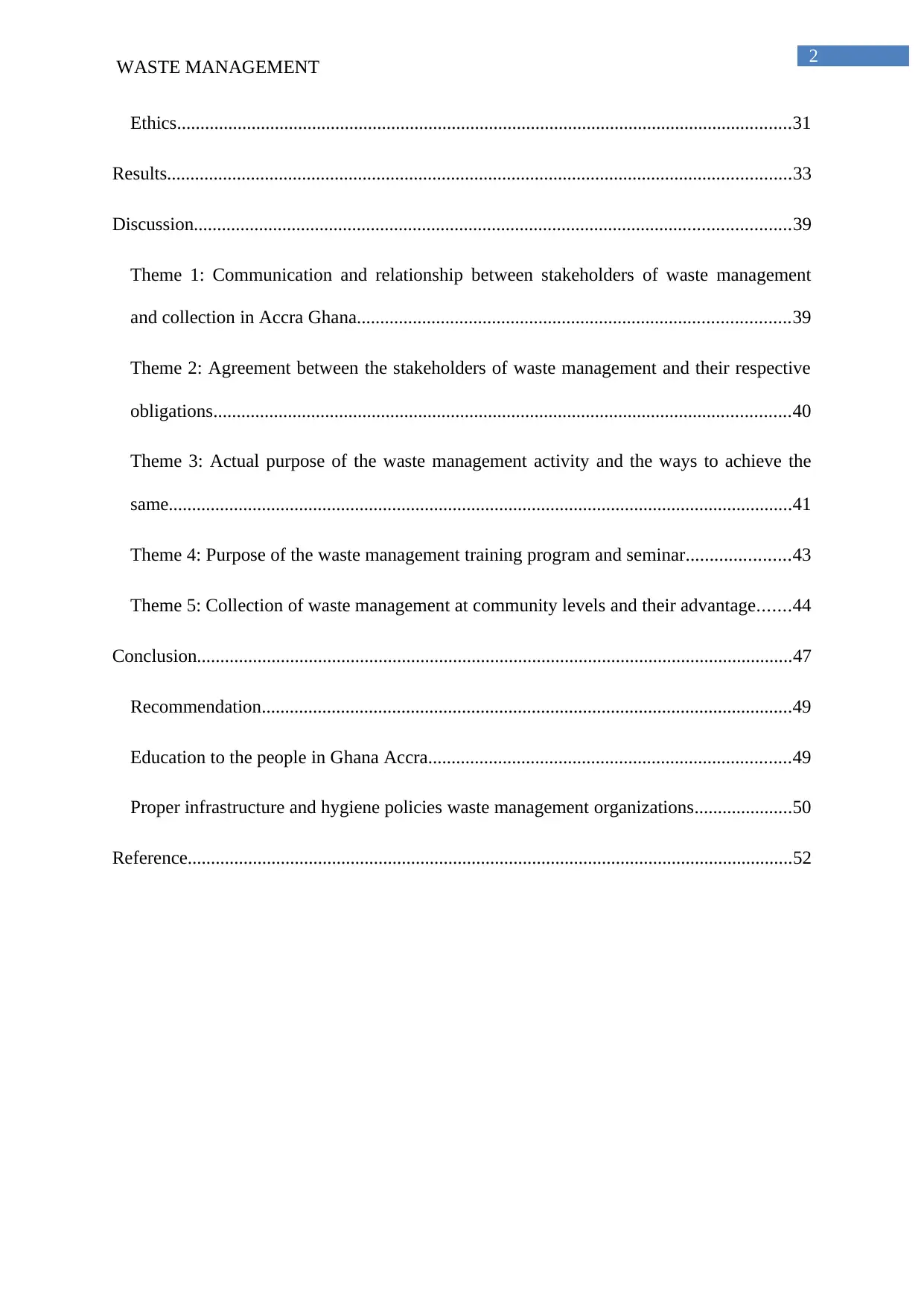
2
WASTE MANAGEMENT
Ethics....................................................................................................................................31
Results......................................................................................................................................33
Discussion................................................................................................................................39
Theme 1: Communication and relationship between stakeholders of waste management
and collection in Accra Ghana.............................................................................................39
Theme 2: Agreement between the stakeholders of waste management and their respective
obligations............................................................................................................................40
Theme 3: Actual purpose of the waste management activity and the ways to achieve the
same......................................................................................................................................41
Theme 4: Purpose of the waste management training program and seminar......................43
Theme 5: Collection of waste management at community levels and their advantage.......44
Conclusion................................................................................................................................47
Recommendation..................................................................................................................49
Education to the people in Ghana Accra..............................................................................49
Proper infrastructure and hygiene policies waste management organizations.....................50
Reference..................................................................................................................................52
WASTE MANAGEMENT
Ethics....................................................................................................................................31
Results......................................................................................................................................33
Discussion................................................................................................................................39
Theme 1: Communication and relationship between stakeholders of waste management
and collection in Accra Ghana.............................................................................................39
Theme 2: Agreement between the stakeholders of waste management and their respective
obligations............................................................................................................................40
Theme 3: Actual purpose of the waste management activity and the ways to achieve the
same......................................................................................................................................41
Theme 4: Purpose of the waste management training program and seminar......................43
Theme 5: Collection of waste management at community levels and their advantage.......44
Conclusion................................................................................................................................47
Recommendation..................................................................................................................49
Education to the people in Ghana Accra..............................................................................49
Proper infrastructure and hygiene policies waste management organizations.....................50
Reference..................................................................................................................................52
⊘ This is a preview!⊘
Do you want full access?
Subscribe today to unlock all pages.

Trusted by 1+ million students worldwide
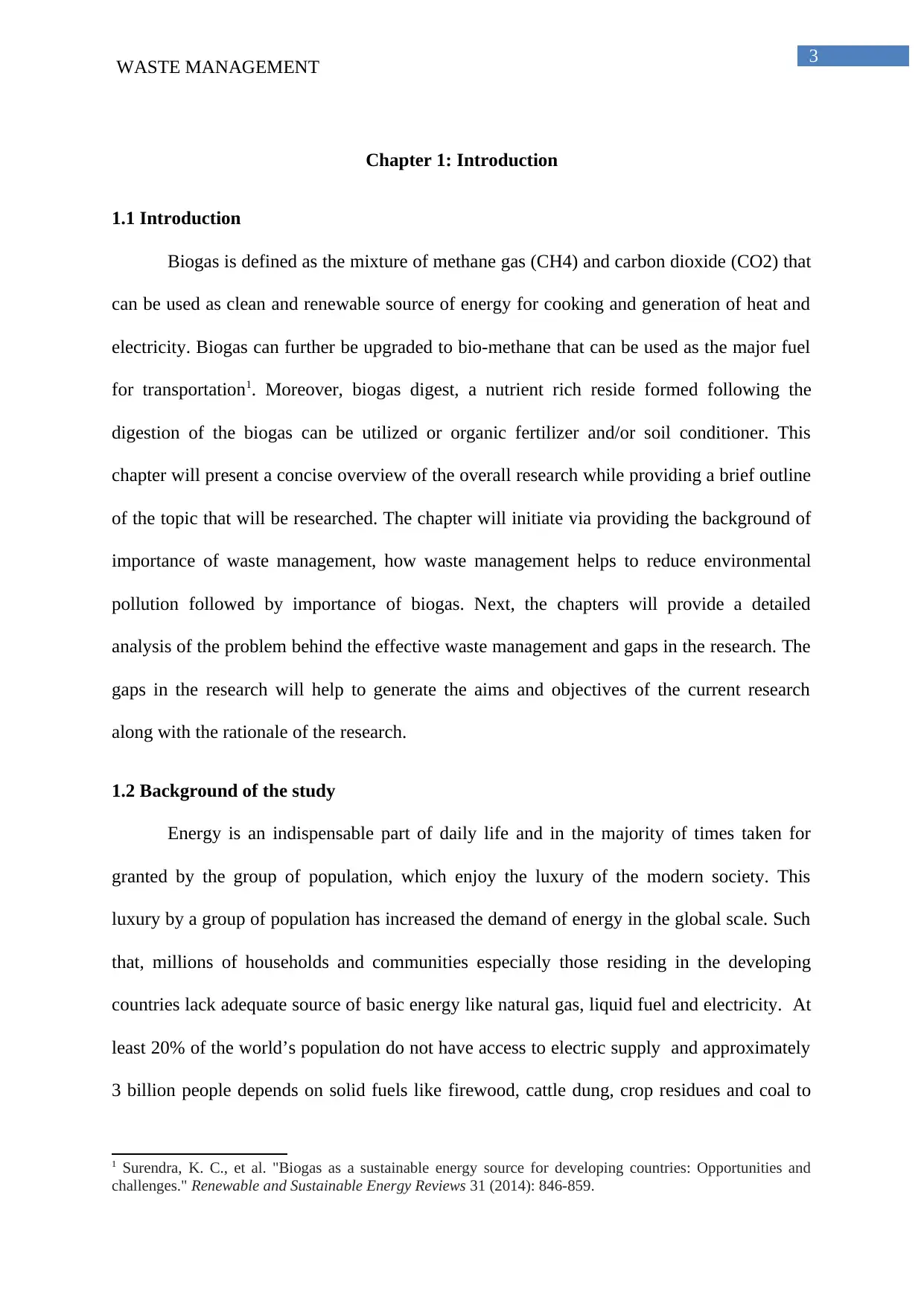
3
WASTE MANAGEMENT
Chapter 1: Introduction
1.1 Introduction
Biogas is defined as the mixture of methane gas (CH4) and carbon dioxide (CO2) that
can be used as clean and renewable source of energy for cooking and generation of heat and
electricity. Biogas can further be upgraded to bio-methane that can be used as the major fuel
for transportation1. Moreover, biogas digest, a nutrient rich reside formed following the
digestion of the biogas can be utilized or organic fertilizer and/or soil conditioner. This
chapter will present a concise overview of the overall research while providing a brief outline
of the topic that will be researched. The chapter will initiate via providing the background of
importance of waste management, how waste management helps to reduce environmental
pollution followed by importance of biogas. Next, the chapters will provide a detailed
analysis of the problem behind the effective waste management and gaps in the research. The
gaps in the research will help to generate the aims and objectives of the current research
along with the rationale of the research.
1.2 Background of the study
Energy is an indispensable part of daily life and in the majority of times taken for
granted by the group of population, which enjoy the luxury of the modern society. This
luxury by a group of population has increased the demand of energy in the global scale. Such
that, millions of households and communities especially those residing in the developing
countries lack adequate source of basic energy like natural gas, liquid fuel and electricity. At
least 20% of the world’s population do not have access to electric supply and approximately
3 billion people depends on solid fuels like firewood, cattle dung, crop residues and coal to
1 Surendra, K. C., et al. "Biogas as a sustainable energy source for developing countries: Opportunities and
challenges." Renewable and Sustainable Energy Reviews 31 (2014): 846-859.
WASTE MANAGEMENT
Chapter 1: Introduction
1.1 Introduction
Biogas is defined as the mixture of methane gas (CH4) and carbon dioxide (CO2) that
can be used as clean and renewable source of energy for cooking and generation of heat and
electricity. Biogas can further be upgraded to bio-methane that can be used as the major fuel
for transportation1. Moreover, biogas digest, a nutrient rich reside formed following the
digestion of the biogas can be utilized or organic fertilizer and/or soil conditioner. This
chapter will present a concise overview of the overall research while providing a brief outline
of the topic that will be researched. The chapter will initiate via providing the background of
importance of waste management, how waste management helps to reduce environmental
pollution followed by importance of biogas. Next, the chapters will provide a detailed
analysis of the problem behind the effective waste management and gaps in the research. The
gaps in the research will help to generate the aims and objectives of the current research
along with the rationale of the research.
1.2 Background of the study
Energy is an indispensable part of daily life and in the majority of times taken for
granted by the group of population, which enjoy the luxury of the modern society. This
luxury by a group of population has increased the demand of energy in the global scale. Such
that, millions of households and communities especially those residing in the developing
countries lack adequate source of basic energy like natural gas, liquid fuel and electricity. At
least 20% of the world’s population do not have access to electric supply and approximately
3 billion people depends on solid fuels like firewood, cattle dung, crop residues and coal to
1 Surendra, K. C., et al. "Biogas as a sustainable energy source for developing countries: Opportunities and
challenges." Renewable and Sustainable Energy Reviews 31 (2014): 846-859.
Paraphrase This Document
Need a fresh take? Get an instant paraphrase of this document with our AI Paraphraser
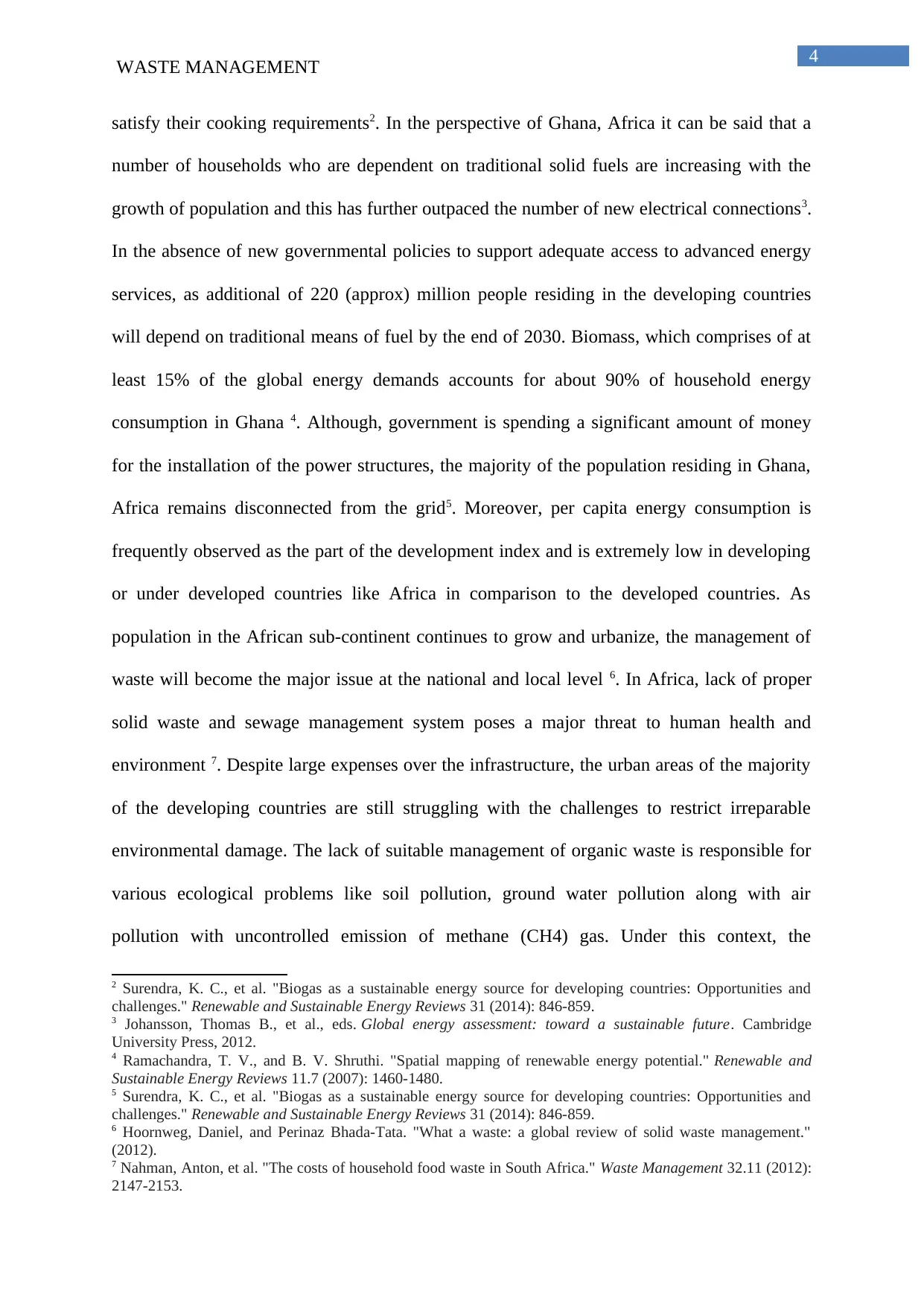
4
WASTE MANAGEMENT
satisfy their cooking requirements2. In the perspective of Ghana, Africa it can be said that a
number of households who are dependent on traditional solid fuels are increasing with the
growth of population and this has further outpaced the number of new electrical connections3.
In the absence of new governmental policies to support adequate access to advanced energy
services, as additional of 220 (approx) million people residing in the developing countries
will depend on traditional means of fuel by the end of 2030. Biomass, which comprises of at
least 15% of the global energy demands accounts for about 90% of household energy
consumption in Ghana 4. Although, government is spending a significant amount of money
for the installation of the power structures, the majority of the population residing in Ghana,
Africa remains disconnected from the grid5. Moreover, per capita energy consumption is
frequently observed as the part of the development index and is extremely low in developing
or under developed countries like Africa in comparison to the developed countries. As
population in the African sub-continent continues to grow and urbanize, the management of
waste will become the major issue at the national and local level 6. In Africa, lack of proper
solid waste and sewage management system poses a major threat to human health and
environment 7. Despite large expenses over the infrastructure, the urban areas of the majority
of the developing countries are still struggling with the challenges to restrict irreparable
environmental damage. The lack of suitable management of organic waste is responsible for
various ecological problems like soil pollution, ground water pollution along with air
pollution with uncontrolled emission of methane (CH4) gas. Under this context, the
2 Surendra, K. C., et al. "Biogas as a sustainable energy source for developing countries: Opportunities and
challenges." Renewable and Sustainable Energy Reviews 31 (2014): 846-859.
3 Johansson, Thomas B., et al., eds. Global energy assessment: toward a sustainable future. Cambridge
University Press, 2012.
4 Ramachandra, T. V., and B. V. Shruthi. "Spatial mapping of renewable energy potential." Renewable and
Sustainable Energy Reviews 11.7 (2007): 1460-1480.
5 Surendra, K. C., et al. "Biogas as a sustainable energy source for developing countries: Opportunities and
challenges." Renewable and Sustainable Energy Reviews 31 (2014): 846-859.
6 Hoornweg, Daniel, and Perinaz Bhada-Tata. "What a waste: a global review of solid waste management."
(2012).
7 Nahman, Anton, et al. "The costs of household food waste in South Africa." Waste Management 32.11 (2012):
2147-2153.
WASTE MANAGEMENT
satisfy their cooking requirements2. In the perspective of Ghana, Africa it can be said that a
number of households who are dependent on traditional solid fuels are increasing with the
growth of population and this has further outpaced the number of new electrical connections3.
In the absence of new governmental policies to support adequate access to advanced energy
services, as additional of 220 (approx) million people residing in the developing countries
will depend on traditional means of fuel by the end of 2030. Biomass, which comprises of at
least 15% of the global energy demands accounts for about 90% of household energy
consumption in Ghana 4. Although, government is spending a significant amount of money
for the installation of the power structures, the majority of the population residing in Ghana,
Africa remains disconnected from the grid5. Moreover, per capita energy consumption is
frequently observed as the part of the development index and is extremely low in developing
or under developed countries like Africa in comparison to the developed countries. As
population in the African sub-continent continues to grow and urbanize, the management of
waste will become the major issue at the national and local level 6. In Africa, lack of proper
solid waste and sewage management system poses a major threat to human health and
environment 7. Despite large expenses over the infrastructure, the urban areas of the majority
of the developing countries are still struggling with the challenges to restrict irreparable
environmental damage. The lack of suitable management of organic waste is responsible for
various ecological problems like soil pollution, ground water pollution along with air
pollution with uncontrolled emission of methane (CH4) gas. Under this context, the
2 Surendra, K. C., et al. "Biogas as a sustainable energy source for developing countries: Opportunities and
challenges." Renewable and Sustainable Energy Reviews 31 (2014): 846-859.
3 Johansson, Thomas B., et al., eds. Global energy assessment: toward a sustainable future. Cambridge
University Press, 2012.
4 Ramachandra, T. V., and B. V. Shruthi. "Spatial mapping of renewable energy potential." Renewable and
Sustainable Energy Reviews 11.7 (2007): 1460-1480.
5 Surendra, K. C., et al. "Biogas as a sustainable energy source for developing countries: Opportunities and
challenges." Renewable and Sustainable Energy Reviews 31 (2014): 846-859.
6 Hoornweg, Daniel, and Perinaz Bhada-Tata. "What a waste: a global review of solid waste management."
(2012).
7 Nahman, Anton, et al. "The costs of household food waste in South Africa." Waste Management 32.11 (2012):
2147-2153.
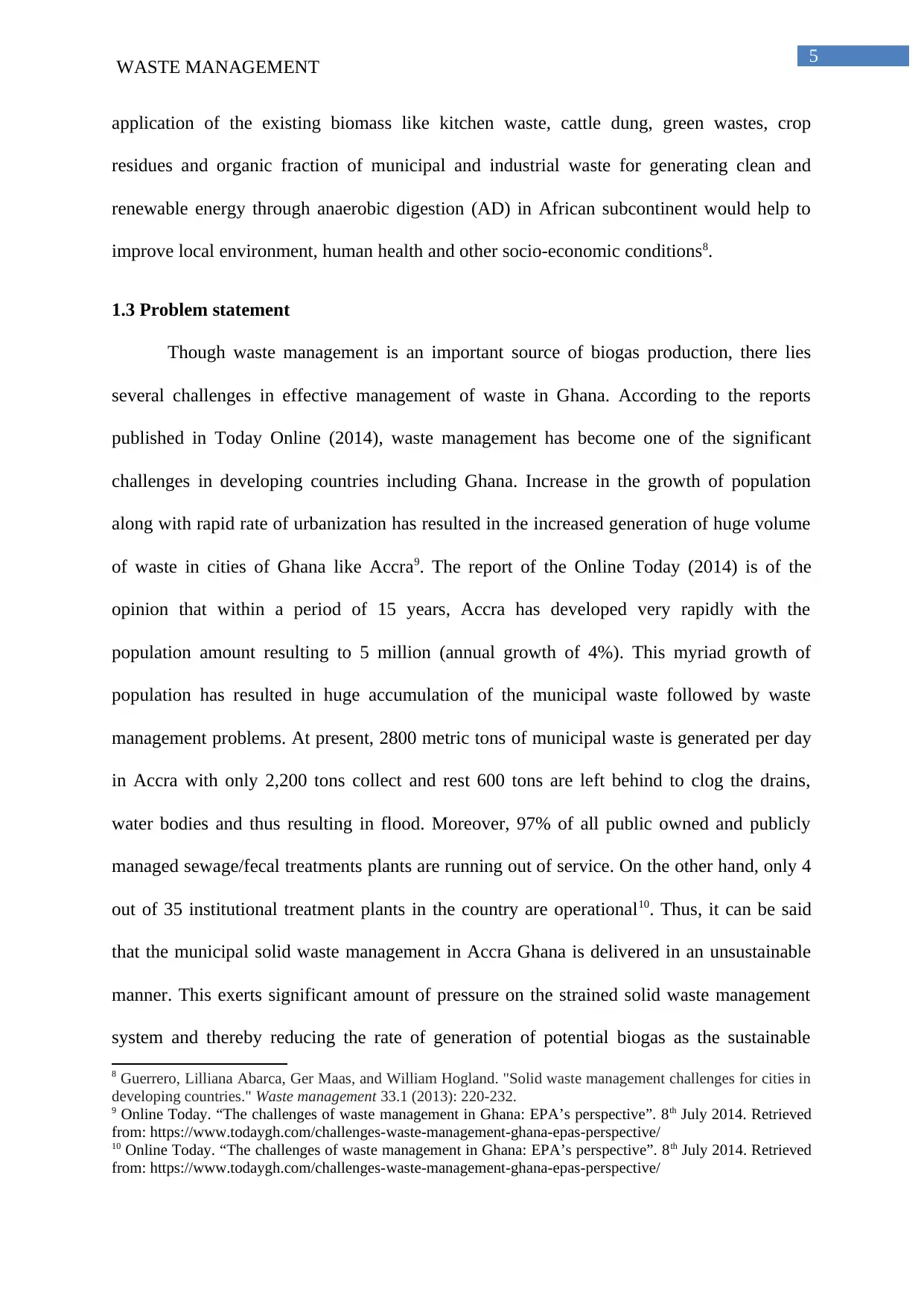
5
WASTE MANAGEMENT
application of the existing biomass like kitchen waste, cattle dung, green wastes, crop
residues and organic fraction of municipal and industrial waste for generating clean and
renewable energy through anaerobic digestion (AD) in African subcontinent would help to
improve local environment, human health and other socio-economic conditions8.
1.3 Problem statement
Though waste management is an important source of biogas production, there lies
several challenges in effective management of waste in Ghana. According to the reports
published in Today Online (2014), waste management has become one of the significant
challenges in developing countries including Ghana. Increase in the growth of population
along with rapid rate of urbanization has resulted in the increased generation of huge volume
of waste in cities of Ghana like Accra9. The report of the Online Today (2014) is of the
opinion that within a period of 15 years, Accra has developed very rapidly with the
population amount resulting to 5 million (annual growth of 4%). This myriad growth of
population has resulted in huge accumulation of the municipal waste followed by waste
management problems. At present, 2800 metric tons of municipal waste is generated per day
in Accra with only 2,200 tons collect and rest 600 tons are left behind to clog the drains,
water bodies and thus resulting in flood. Moreover, 97% of all public owned and publicly
managed sewage/fecal treatments plants are running out of service. On the other hand, only 4
out of 35 institutional treatment plants in the country are operational10. Thus, it can be said
that the municipal solid waste management in Accra Ghana is delivered in an unsustainable
manner. This exerts significant amount of pressure on the strained solid waste management
system and thereby reducing the rate of generation of potential biogas as the sustainable
8 Guerrero, Lilliana Abarca, Ger Maas, and William Hogland. "Solid waste management challenges for cities in
developing countries." Waste management 33.1 (2013): 220-232.
9 Online Today. “The challenges of waste management in Ghana: EPA’s perspective”. 8th July 2014. Retrieved
from: https://www.todaygh.com/challenges-waste-management-ghana-epas-perspective/
10 Online Today. “The challenges of waste management in Ghana: EPA’s perspective”. 8th July 2014. Retrieved
from: https://www.todaygh.com/challenges-waste-management-ghana-epas-perspective/
WASTE MANAGEMENT
application of the existing biomass like kitchen waste, cattle dung, green wastes, crop
residues and organic fraction of municipal and industrial waste for generating clean and
renewable energy through anaerobic digestion (AD) in African subcontinent would help to
improve local environment, human health and other socio-economic conditions8.
1.3 Problem statement
Though waste management is an important source of biogas production, there lies
several challenges in effective management of waste in Ghana. According to the reports
published in Today Online (2014), waste management has become one of the significant
challenges in developing countries including Ghana. Increase in the growth of population
along with rapid rate of urbanization has resulted in the increased generation of huge volume
of waste in cities of Ghana like Accra9. The report of the Online Today (2014) is of the
opinion that within a period of 15 years, Accra has developed very rapidly with the
population amount resulting to 5 million (annual growth of 4%). This myriad growth of
population has resulted in huge accumulation of the municipal waste followed by waste
management problems. At present, 2800 metric tons of municipal waste is generated per day
in Accra with only 2,200 tons collect and rest 600 tons are left behind to clog the drains,
water bodies and thus resulting in flood. Moreover, 97% of all public owned and publicly
managed sewage/fecal treatments plants are running out of service. On the other hand, only 4
out of 35 institutional treatment plants in the country are operational10. Thus, it can be said
that the municipal solid waste management in Accra Ghana is delivered in an unsustainable
manner. This exerts significant amount of pressure on the strained solid waste management
system and thereby reducing the rate of generation of potential biogas as the sustainable
8 Guerrero, Lilliana Abarca, Ger Maas, and William Hogland. "Solid waste management challenges for cities in
developing countries." Waste management 33.1 (2013): 220-232.
9 Online Today. “The challenges of waste management in Ghana: EPA’s perspective”. 8th July 2014. Retrieved
from: https://www.todaygh.com/challenges-waste-management-ghana-epas-perspective/
10 Online Today. “The challenges of waste management in Ghana: EPA’s perspective”. 8th July 2014. Retrieved
from: https://www.todaygh.com/challenges-waste-management-ghana-epas-perspective/
⊘ This is a preview!⊘
Do you want full access?
Subscribe today to unlock all pages.

Trusted by 1+ million students worldwide
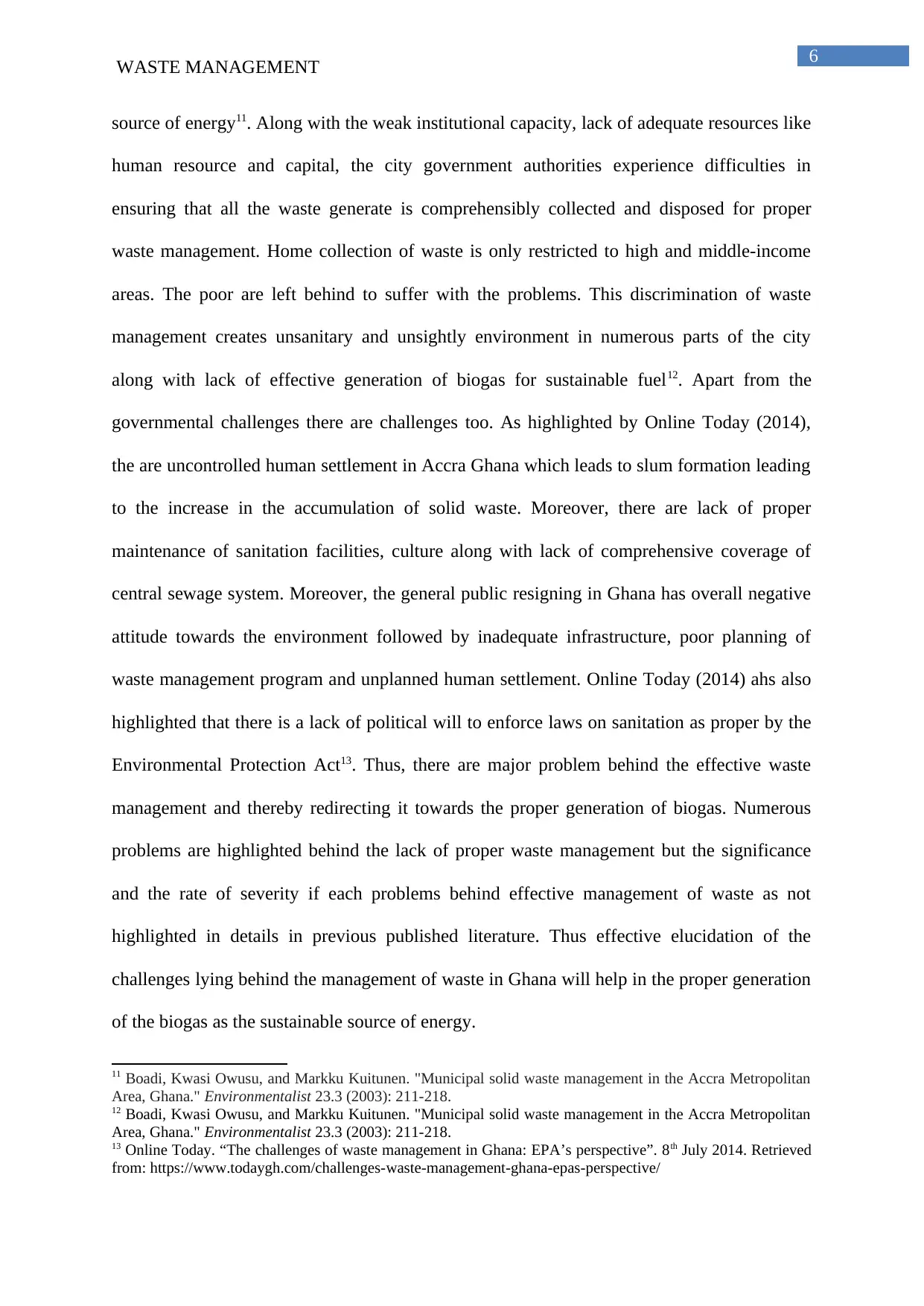
6
WASTE MANAGEMENT
source of energy11. Along with the weak institutional capacity, lack of adequate resources like
human resource and capital, the city government authorities experience difficulties in
ensuring that all the waste generate is comprehensibly collected and disposed for proper
waste management. Home collection of waste is only restricted to high and middle-income
areas. The poor are left behind to suffer with the problems. This discrimination of waste
management creates unsanitary and unsightly environment in numerous parts of the city
along with lack of effective generation of biogas for sustainable fuel12. Apart from the
governmental challenges there are challenges too. As highlighted by Online Today (2014),
the are uncontrolled human settlement in Accra Ghana which leads to slum formation leading
to the increase in the accumulation of solid waste. Moreover, there are lack of proper
maintenance of sanitation facilities, culture along with lack of comprehensive coverage of
central sewage system. Moreover, the general public resigning in Ghana has overall negative
attitude towards the environment followed by inadequate infrastructure, poor planning of
waste management program and unplanned human settlement. Online Today (2014) ahs also
highlighted that there is a lack of political will to enforce laws on sanitation as proper by the
Environmental Protection Act13. Thus, there are major problem behind the effective waste
management and thereby redirecting it towards the proper generation of biogas. Numerous
problems are highlighted behind the lack of proper waste management but the significance
and the rate of severity if each problems behind effective management of waste as not
highlighted in details in previous published literature. Thus effective elucidation of the
challenges lying behind the management of waste in Ghana will help in the proper generation
of the biogas as the sustainable source of energy.
11 Boadi, Kwasi Owusu, and Markku Kuitunen. "Municipal solid waste management in the Accra Metropolitan
Area, Ghana." Environmentalist 23.3 (2003): 211-218.
12 Boadi, Kwasi Owusu, and Markku Kuitunen. "Municipal solid waste management in the Accra Metropolitan
Area, Ghana." Environmentalist 23.3 (2003): 211-218.
13 Online Today. “The challenges of waste management in Ghana: EPA’s perspective”. 8th July 2014. Retrieved
from: https://www.todaygh.com/challenges-waste-management-ghana-epas-perspective/
WASTE MANAGEMENT
source of energy11. Along with the weak institutional capacity, lack of adequate resources like
human resource and capital, the city government authorities experience difficulties in
ensuring that all the waste generate is comprehensibly collected and disposed for proper
waste management. Home collection of waste is only restricted to high and middle-income
areas. The poor are left behind to suffer with the problems. This discrimination of waste
management creates unsanitary and unsightly environment in numerous parts of the city
along with lack of effective generation of biogas for sustainable fuel12. Apart from the
governmental challenges there are challenges too. As highlighted by Online Today (2014),
the are uncontrolled human settlement in Accra Ghana which leads to slum formation leading
to the increase in the accumulation of solid waste. Moreover, there are lack of proper
maintenance of sanitation facilities, culture along with lack of comprehensive coverage of
central sewage system. Moreover, the general public resigning in Ghana has overall negative
attitude towards the environment followed by inadequate infrastructure, poor planning of
waste management program and unplanned human settlement. Online Today (2014) ahs also
highlighted that there is a lack of political will to enforce laws on sanitation as proper by the
Environmental Protection Act13. Thus, there are major problem behind the effective waste
management and thereby redirecting it towards the proper generation of biogas. Numerous
problems are highlighted behind the lack of proper waste management but the significance
and the rate of severity if each problems behind effective management of waste as not
highlighted in details in previous published literature. Thus effective elucidation of the
challenges lying behind the management of waste in Ghana will help in the proper generation
of the biogas as the sustainable source of energy.
11 Boadi, Kwasi Owusu, and Markku Kuitunen. "Municipal solid waste management in the Accra Metropolitan
Area, Ghana." Environmentalist 23.3 (2003): 211-218.
12 Boadi, Kwasi Owusu, and Markku Kuitunen. "Municipal solid waste management in the Accra Metropolitan
Area, Ghana." Environmentalist 23.3 (2003): 211-218.
13 Online Today. “The challenges of waste management in Ghana: EPA’s perspective”. 8th July 2014. Retrieved
from: https://www.todaygh.com/challenges-waste-management-ghana-epas-perspective/
Paraphrase This Document
Need a fresh take? Get an instant paraphrase of this document with our AI Paraphraser
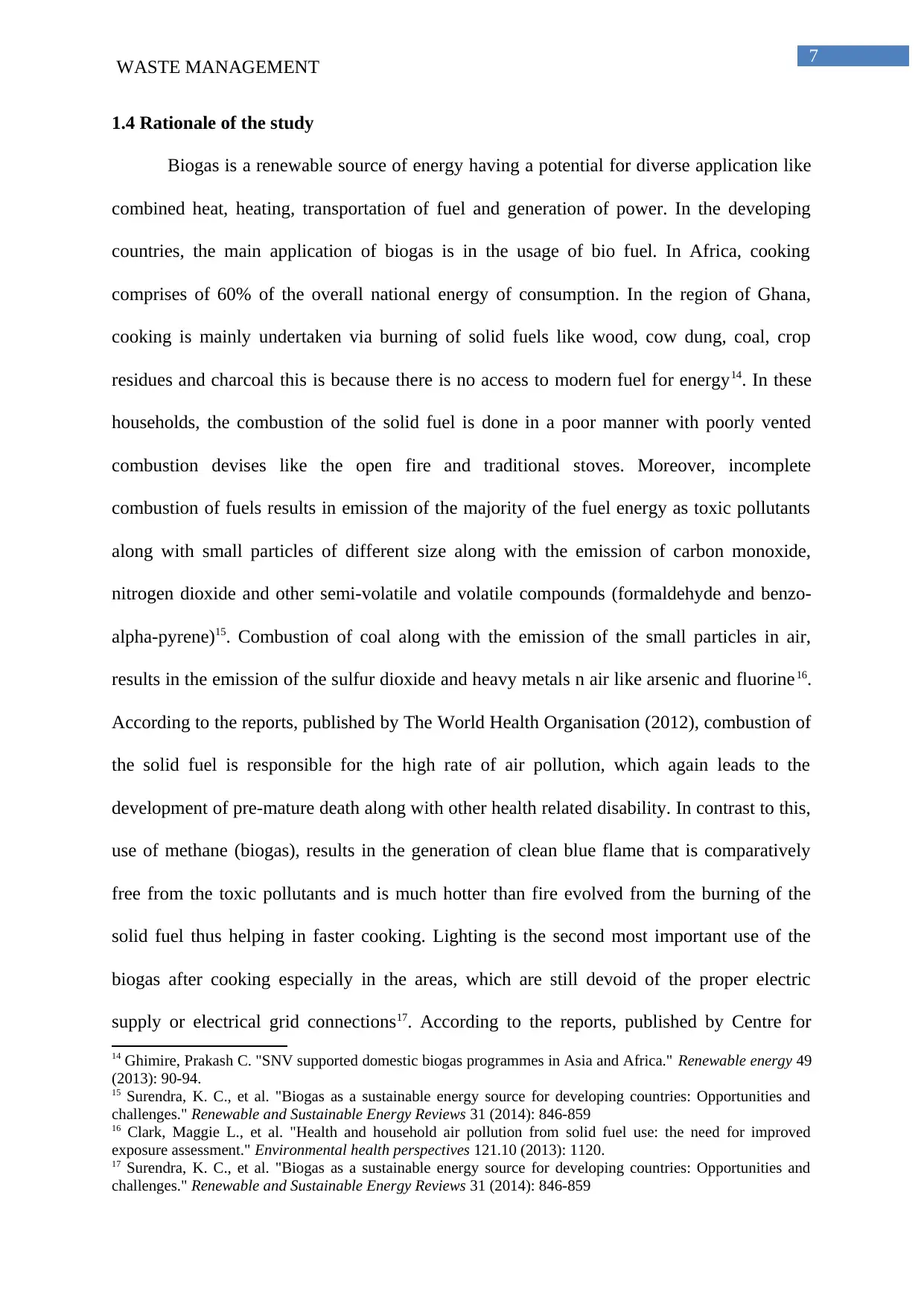
7
WASTE MANAGEMENT
1.4 Rationale of the study
Biogas is a renewable source of energy having a potential for diverse application like
combined heat, heating, transportation of fuel and generation of power. In the developing
countries, the main application of biogas is in the usage of bio fuel. In Africa, cooking
comprises of 60% of the overall national energy of consumption. In the region of Ghana,
cooking is mainly undertaken via burning of solid fuels like wood, cow dung, coal, crop
residues and charcoal this is because there is no access to modern fuel for energy14. In these
households, the combustion of the solid fuel is done in a poor manner with poorly vented
combustion devises like the open fire and traditional stoves. Moreover, incomplete
combustion of fuels results in emission of the majority of the fuel energy as toxic pollutants
along with small particles of different size along with the emission of carbon monoxide,
nitrogen dioxide and other semi-volatile and volatile compounds (formaldehyde and benzo-
alpha-pyrene)15. Combustion of coal along with the emission of the small particles in air,
results in the emission of the sulfur dioxide and heavy metals n air like arsenic and fluorine16.
According to the reports, published by The World Health Organisation (2012), combustion of
the solid fuel is responsible for the high rate of air pollution, which again leads to the
development of pre-mature death along with other health related disability. In contrast to this,
use of methane (biogas), results in the generation of clean blue flame that is comparatively
free from the toxic pollutants and is much hotter than fire evolved from the burning of the
solid fuel thus helping in faster cooking. Lighting is the second most important use of the
biogas after cooking especially in the areas, which are still devoid of the proper electric
supply or electrical grid connections17. According to the reports, published by Centre for
14 Ghimire, Prakash C. "SNV supported domestic biogas programmes in Asia and Africa." Renewable energy 49
(2013): 90-94.
15 Surendra, K. C., et al. "Biogas as a sustainable energy source for developing countries: Opportunities and
challenges." Renewable and Sustainable Energy Reviews 31 (2014): 846-859
16 Clark, Maggie L., et al. "Health and household air pollution from solid fuel use: the need for improved
exposure assessment." Environmental health perspectives 121.10 (2013): 1120.
17 Surendra, K. C., et al. "Biogas as a sustainable energy source for developing countries: Opportunities and
challenges." Renewable and Sustainable Energy Reviews 31 (2014): 846-859
WASTE MANAGEMENT
1.4 Rationale of the study
Biogas is a renewable source of energy having a potential for diverse application like
combined heat, heating, transportation of fuel and generation of power. In the developing
countries, the main application of biogas is in the usage of bio fuel. In Africa, cooking
comprises of 60% of the overall national energy of consumption. In the region of Ghana,
cooking is mainly undertaken via burning of solid fuels like wood, cow dung, coal, crop
residues and charcoal this is because there is no access to modern fuel for energy14. In these
households, the combustion of the solid fuel is done in a poor manner with poorly vented
combustion devises like the open fire and traditional stoves. Moreover, incomplete
combustion of fuels results in emission of the majority of the fuel energy as toxic pollutants
along with small particles of different size along with the emission of carbon monoxide,
nitrogen dioxide and other semi-volatile and volatile compounds (formaldehyde and benzo-
alpha-pyrene)15. Combustion of coal along with the emission of the small particles in air,
results in the emission of the sulfur dioxide and heavy metals n air like arsenic and fluorine16.
According to the reports, published by The World Health Organisation (2012), combustion of
the solid fuel is responsible for the high rate of air pollution, which again leads to the
development of pre-mature death along with other health related disability. In contrast to this,
use of methane (biogas), results in the generation of clean blue flame that is comparatively
free from the toxic pollutants and is much hotter than fire evolved from the burning of the
solid fuel thus helping in faster cooking. Lighting is the second most important use of the
biogas after cooking especially in the areas, which are still devoid of the proper electric
supply or electrical grid connections17. According to the reports, published by Centre for
14 Ghimire, Prakash C. "SNV supported domestic biogas programmes in Asia and Africa." Renewable energy 49
(2013): 90-94.
15 Surendra, K. C., et al. "Biogas as a sustainable energy source for developing countries: Opportunities and
challenges." Renewable and Sustainable Energy Reviews 31 (2014): 846-859
16 Clark, Maggie L., et al. "Health and household air pollution from solid fuel use: the need for improved
exposure assessment." Environmental health perspectives 121.10 (2013): 1120.
17 Surendra, K. C., et al. "Biogas as a sustainable energy source for developing countries: Opportunities and
challenges." Renewable and Sustainable Energy Reviews 31 (2014): 846-859
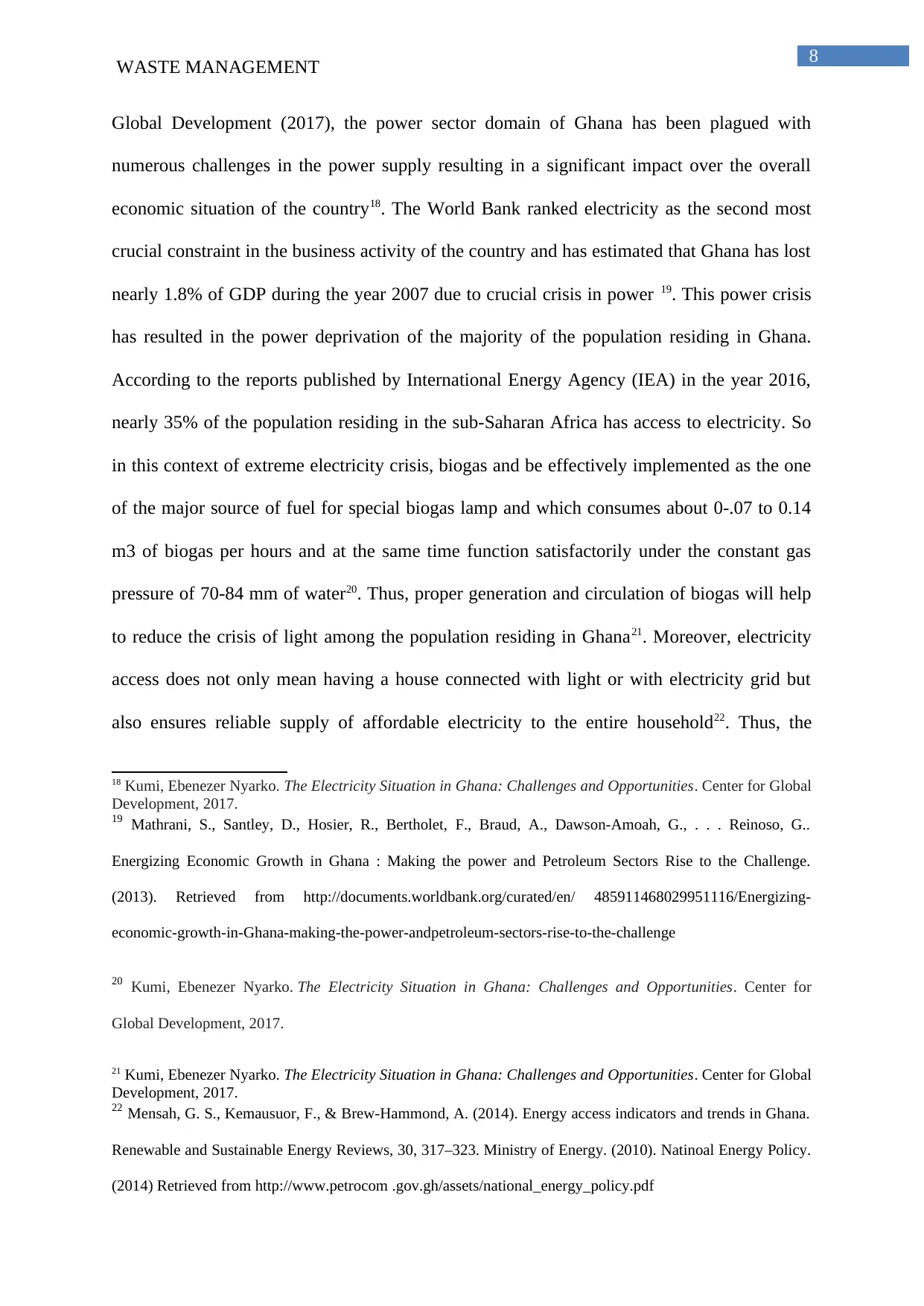
8
WASTE MANAGEMENT
Global Development (2017), the power sector domain of Ghana has been plagued with
numerous challenges in the power supply resulting in a significant impact over the overall
economic situation of the country18. The World Bank ranked electricity as the second most
crucial constraint in the business activity of the country and has estimated that Ghana has lost
nearly 1.8% of GDP during the year 2007 due to crucial crisis in power 19. This power crisis
has resulted in the power deprivation of the majority of the population residing in Ghana.
According to the reports published by International Energy Agency (IEA) in the year 2016,
nearly 35% of the population residing in the sub-Saharan Africa has access to electricity. So
in this context of extreme electricity crisis, biogas and be effectively implemented as the one
of the major source of fuel for special biogas lamp and which consumes about 0-.07 to 0.14
m3 of biogas per hours and at the same time function satisfactorily under the constant gas
pressure of 70-84 mm of water20. Thus, proper generation and circulation of biogas will help
to reduce the crisis of light among the population residing in Ghana21. Moreover, electricity
access does not only mean having a house connected with light or with electricity grid but
also ensures reliable supply of affordable electricity to the entire household22. Thus, the
18 Kumi, Ebenezer Nyarko. The Electricity Situation in Ghana: Challenges and Opportunities. Center for Global
Development, 2017.
19 Mathrani, S., Santley, D., Hosier, R., Bertholet, F., Braud, A., Dawson-Amoah, G., . . . Reinoso, G..
Energizing Economic Growth in Ghana : Making the power and Petroleum Sectors Rise to the Challenge.
(2013). Retrieved from http://documents.worldbank.org/curated/en/ 485911468029951116/Energizing-
economic-growth-in-Ghana-making-the-power-andpetroleum-sectors-rise-to-the-challenge
20 Kumi, Ebenezer Nyarko. The Electricity Situation in Ghana: Challenges and Opportunities. Center for
Global Development, 2017.
21 Kumi, Ebenezer Nyarko. The Electricity Situation in Ghana: Challenges and Opportunities. Center for Global
Development, 2017.
22 Mensah, G. S., Kemausuor, F., & Brew-Hammond, A. (2014). Energy access indicators and trends in Ghana.
Renewable and Sustainable Energy Reviews, 30, 317–323. Ministry of Energy. (2010). Natinoal Energy Policy.
(2014) Retrieved from http://www.petrocom .gov.gh/assets/national_energy_policy.pdf
WASTE MANAGEMENT
Global Development (2017), the power sector domain of Ghana has been plagued with
numerous challenges in the power supply resulting in a significant impact over the overall
economic situation of the country18. The World Bank ranked electricity as the second most
crucial constraint in the business activity of the country and has estimated that Ghana has lost
nearly 1.8% of GDP during the year 2007 due to crucial crisis in power 19. This power crisis
has resulted in the power deprivation of the majority of the population residing in Ghana.
According to the reports published by International Energy Agency (IEA) in the year 2016,
nearly 35% of the population residing in the sub-Saharan Africa has access to electricity. So
in this context of extreme electricity crisis, biogas and be effectively implemented as the one
of the major source of fuel for special biogas lamp and which consumes about 0-.07 to 0.14
m3 of biogas per hours and at the same time function satisfactorily under the constant gas
pressure of 70-84 mm of water20. Thus, proper generation and circulation of biogas will help
to reduce the crisis of light among the population residing in Ghana21. Moreover, electricity
access does not only mean having a house connected with light or with electricity grid but
also ensures reliable supply of affordable electricity to the entire household22. Thus, the
18 Kumi, Ebenezer Nyarko. The Electricity Situation in Ghana: Challenges and Opportunities. Center for Global
Development, 2017.
19 Mathrani, S., Santley, D., Hosier, R., Bertholet, F., Braud, A., Dawson-Amoah, G., . . . Reinoso, G..
Energizing Economic Growth in Ghana : Making the power and Petroleum Sectors Rise to the Challenge.
(2013). Retrieved from http://documents.worldbank.org/curated/en/ 485911468029951116/Energizing-
economic-growth-in-Ghana-making-the-power-andpetroleum-sectors-rise-to-the-challenge
20 Kumi, Ebenezer Nyarko. The Electricity Situation in Ghana: Challenges and Opportunities. Center for
Global Development, 2017.
21 Kumi, Ebenezer Nyarko. The Electricity Situation in Ghana: Challenges and Opportunities. Center for Global
Development, 2017.
22 Mensah, G. S., Kemausuor, F., & Brew-Hammond, A. (2014). Energy access indicators and trends in Ghana.
Renewable and Sustainable Energy Reviews, 30, 317–323. Ministry of Energy. (2010). Natinoal Energy Policy.
(2014) Retrieved from http://www.petrocom .gov.gh/assets/national_energy_policy.pdf
⊘ This is a preview!⊘
Do you want full access?
Subscribe today to unlock all pages.

Trusted by 1+ million students worldwide
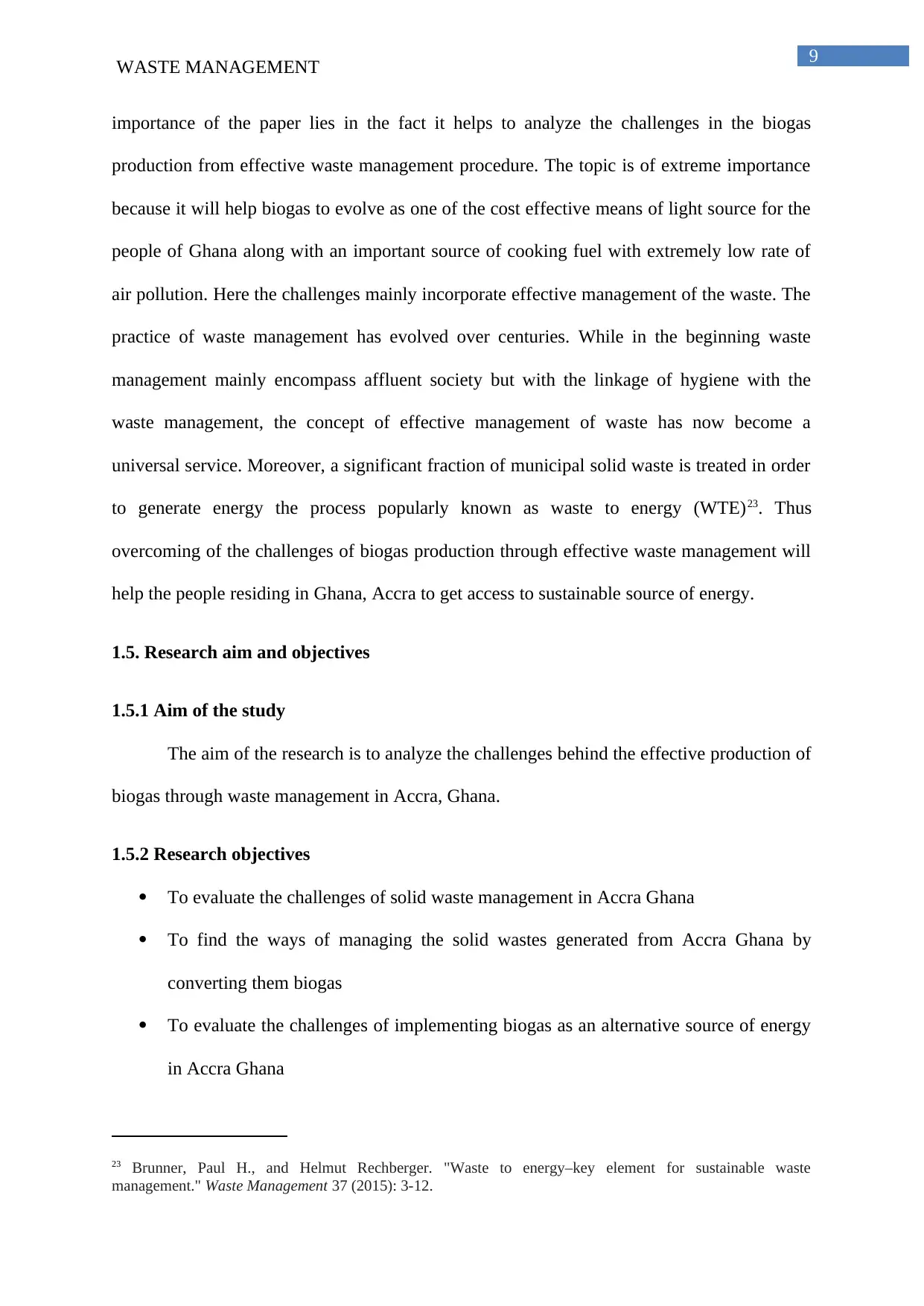
9
WASTE MANAGEMENT
importance of the paper lies in the fact it helps to analyze the challenges in the biogas
production from effective waste management procedure. The topic is of extreme importance
because it will help biogas to evolve as one of the cost effective means of light source for the
people of Ghana along with an important source of cooking fuel with extremely low rate of
air pollution. Here the challenges mainly incorporate effective management of the waste. The
practice of waste management has evolved over centuries. While in the beginning waste
management mainly encompass affluent society but with the linkage of hygiene with the
waste management, the concept of effective management of waste has now become a
universal service. Moreover, a significant fraction of municipal solid waste is treated in order
to generate energy the process popularly known as waste to energy (WTE)23. Thus
overcoming of the challenges of biogas production through effective waste management will
help the people residing in Ghana, Accra to get access to sustainable source of energy.
1.5. Research aim and objectives
1.5.1 Aim of the study
The aim of the research is to analyze the challenges behind the effective production of
biogas through waste management in Accra, Ghana.
1.5.2 Research objectives
To evaluate the challenges of solid waste management in Accra Ghana
To find the ways of managing the solid wastes generated from Accra Ghana by
converting them biogas
To evaluate the challenges of implementing biogas as an alternative source of energy
in Accra Ghana
23 Brunner, Paul H., and Helmut Rechberger. "Waste to energy–key element for sustainable waste
management." Waste Management 37 (2015): 3-12.
WASTE MANAGEMENT
importance of the paper lies in the fact it helps to analyze the challenges in the biogas
production from effective waste management procedure. The topic is of extreme importance
because it will help biogas to evolve as one of the cost effective means of light source for the
people of Ghana along with an important source of cooking fuel with extremely low rate of
air pollution. Here the challenges mainly incorporate effective management of the waste. The
practice of waste management has evolved over centuries. While in the beginning waste
management mainly encompass affluent society but with the linkage of hygiene with the
waste management, the concept of effective management of waste has now become a
universal service. Moreover, a significant fraction of municipal solid waste is treated in order
to generate energy the process popularly known as waste to energy (WTE)23. Thus
overcoming of the challenges of biogas production through effective waste management will
help the people residing in Ghana, Accra to get access to sustainable source of energy.
1.5. Research aim and objectives
1.5.1 Aim of the study
The aim of the research is to analyze the challenges behind the effective production of
biogas through waste management in Accra, Ghana.
1.5.2 Research objectives
To evaluate the challenges of solid waste management in Accra Ghana
To find the ways of managing the solid wastes generated from Accra Ghana by
converting them biogas
To evaluate the challenges of implementing biogas as an alternative source of energy
in Accra Ghana
23 Brunner, Paul H., and Helmut Rechberger. "Waste to energy–key element for sustainable waste
management." Waste Management 37 (2015): 3-12.
Paraphrase This Document
Need a fresh take? Get an instant paraphrase of this document with our AI Paraphraser
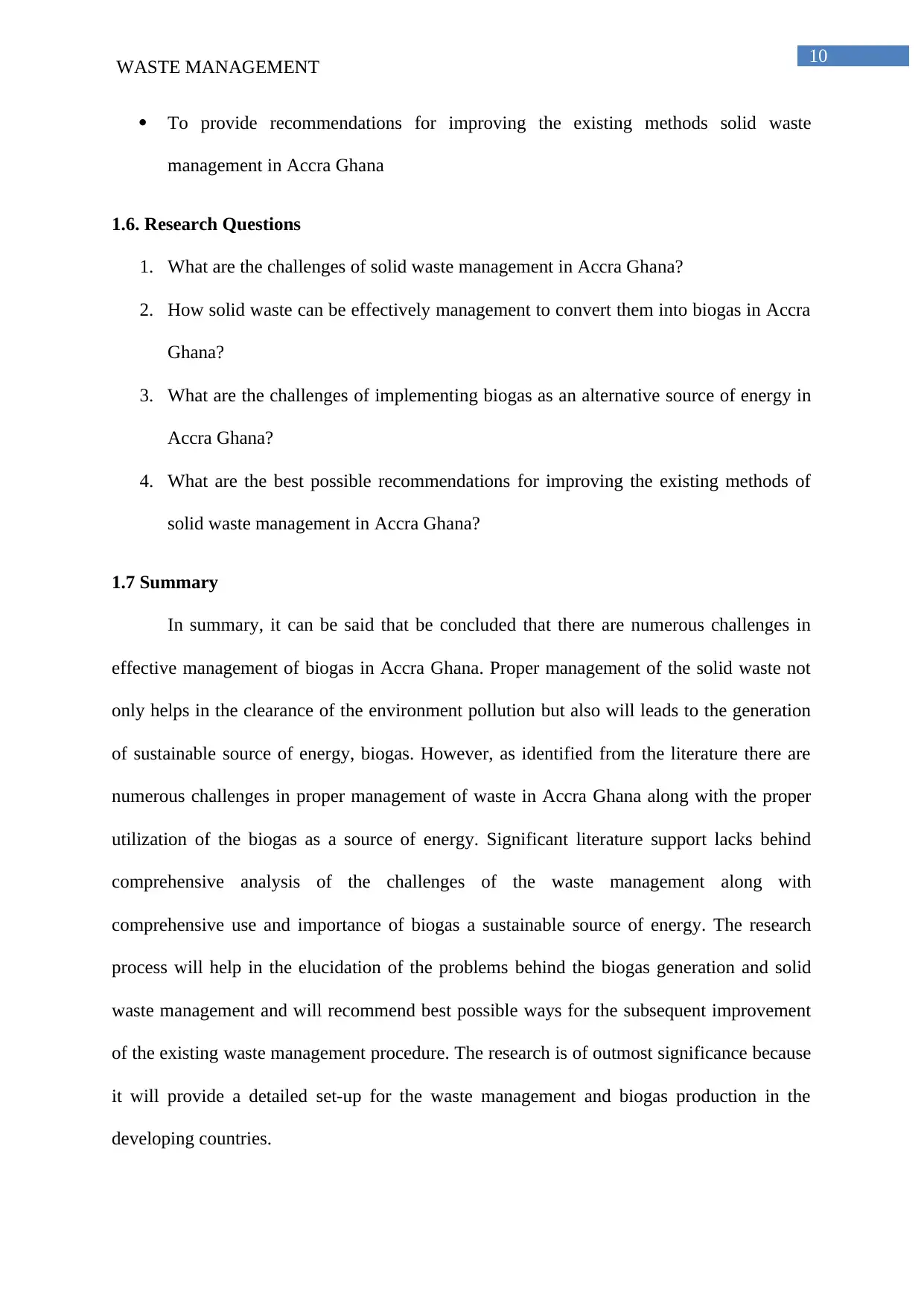
10
WASTE MANAGEMENT
To provide recommendations for improving the existing methods solid waste
management in Accra Ghana
1.6. Research Questions
1. What are the challenges of solid waste management in Accra Ghana?
2. How solid waste can be effectively management to convert them into biogas in Accra
Ghana?
3. What are the challenges of implementing biogas as an alternative source of energy in
Accra Ghana?
4. What are the best possible recommendations for improving the existing methods of
solid waste management in Accra Ghana?
1.7 Summary
In summary, it can be said that be concluded that there are numerous challenges in
effective management of biogas in Accra Ghana. Proper management of the solid waste not
only helps in the clearance of the environment pollution but also will leads to the generation
of sustainable source of energy, biogas. However, as identified from the literature there are
numerous challenges in proper management of waste in Accra Ghana along with the proper
utilization of the biogas as a source of energy. Significant literature support lacks behind
comprehensive analysis of the challenges of the waste management along with
comprehensive use and importance of biogas a sustainable source of energy. The research
process will help in the elucidation of the problems behind the biogas generation and solid
waste management and will recommend best possible ways for the subsequent improvement
of the existing waste management procedure. The research is of outmost significance because
it will provide a detailed set-up for the waste management and biogas production in the
developing countries.
WASTE MANAGEMENT
To provide recommendations for improving the existing methods solid waste
management in Accra Ghana
1.6. Research Questions
1. What are the challenges of solid waste management in Accra Ghana?
2. How solid waste can be effectively management to convert them into biogas in Accra
Ghana?
3. What are the challenges of implementing biogas as an alternative source of energy in
Accra Ghana?
4. What are the best possible recommendations for improving the existing methods of
solid waste management in Accra Ghana?
1.7 Summary
In summary, it can be said that be concluded that there are numerous challenges in
effective management of biogas in Accra Ghana. Proper management of the solid waste not
only helps in the clearance of the environment pollution but also will leads to the generation
of sustainable source of energy, biogas. However, as identified from the literature there are
numerous challenges in proper management of waste in Accra Ghana along with the proper
utilization of the biogas as a source of energy. Significant literature support lacks behind
comprehensive analysis of the challenges of the waste management along with
comprehensive use and importance of biogas a sustainable source of energy. The research
process will help in the elucidation of the problems behind the biogas generation and solid
waste management and will recommend best possible ways for the subsequent improvement
of the existing waste management procedure. The research is of outmost significance because
it will provide a detailed set-up for the waste management and biogas production in the
developing countries.
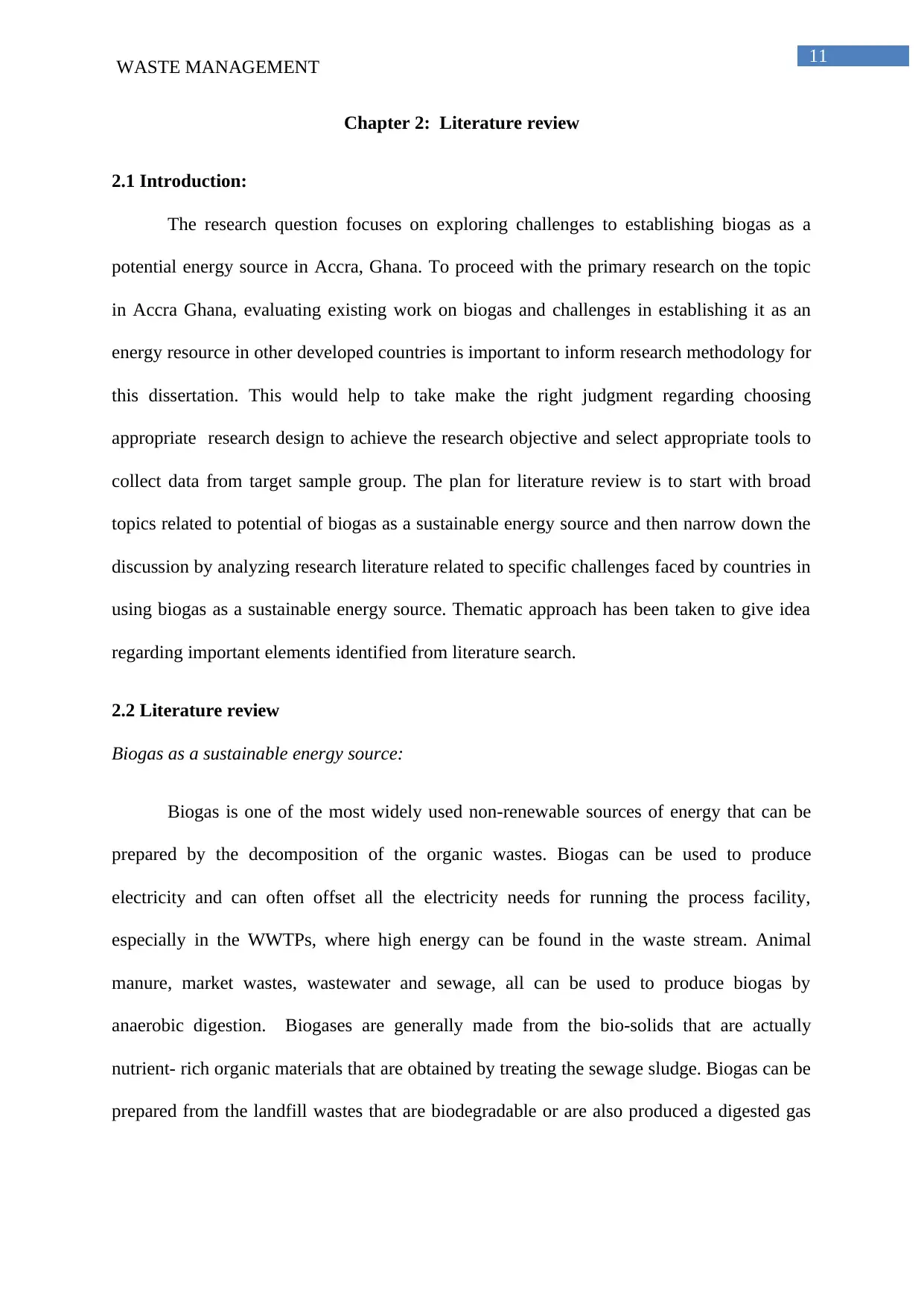
11
WASTE MANAGEMENT
Chapter 2: Literature review
2.1 Introduction:
The research question focuses on exploring challenges to establishing biogas as a
potential energy source in Accra, Ghana. To proceed with the primary research on the topic
in Accra Ghana, evaluating existing work on biogas and challenges in establishing it as an
energy resource in other developed countries is important to inform research methodology for
this dissertation. This would help to take make the right judgment regarding choosing
appropriate research design to achieve the research objective and select appropriate tools to
collect data from target sample group. The plan for literature review is to start with broad
topics related to potential of biogas as a sustainable energy source and then narrow down the
discussion by analyzing research literature related to specific challenges faced by countries in
using biogas as a sustainable energy source. Thematic approach has been taken to give idea
regarding important elements identified from literature search.
2.2 Literature review
Biogas as a sustainable energy source:
Biogas is one of the most widely used non-renewable sources of energy that can be
prepared by the decomposition of the organic wastes. Biogas can be used to produce
electricity and can often offset all the electricity needs for running the process facility,
especially in the WWTPs, where high energy can be found in the waste stream. Animal
manure, market wastes, wastewater and sewage, all can be used to produce biogas by
anaerobic digestion. Biogases are generally made from the bio-solids that are actually
nutrient- rich organic materials that are obtained by treating the sewage sludge. Biogas can be
prepared from the landfill wastes that are biodegradable or are also produced a digested gas
WASTE MANAGEMENT
Chapter 2: Literature review
2.1 Introduction:
The research question focuses on exploring challenges to establishing biogas as a
potential energy source in Accra, Ghana. To proceed with the primary research on the topic
in Accra Ghana, evaluating existing work on biogas and challenges in establishing it as an
energy resource in other developed countries is important to inform research methodology for
this dissertation. This would help to take make the right judgment regarding choosing
appropriate research design to achieve the research objective and select appropriate tools to
collect data from target sample group. The plan for literature review is to start with broad
topics related to potential of biogas as a sustainable energy source and then narrow down the
discussion by analyzing research literature related to specific challenges faced by countries in
using biogas as a sustainable energy source. Thematic approach has been taken to give idea
regarding important elements identified from literature search.
2.2 Literature review
Biogas as a sustainable energy source:
Biogas is one of the most widely used non-renewable sources of energy that can be
prepared by the decomposition of the organic wastes. Biogas can be used to produce
electricity and can often offset all the electricity needs for running the process facility,
especially in the WWTPs, where high energy can be found in the waste stream. Animal
manure, market wastes, wastewater and sewage, all can be used to produce biogas by
anaerobic digestion. Biogases are generally made from the bio-solids that are actually
nutrient- rich organic materials that are obtained by treating the sewage sludge. Biogas can be
prepared from the landfill wastes that are biodegradable or are also produced a digested gas
⊘ This is a preview!⊘
Do you want full access?
Subscribe today to unlock all pages.

Trusted by 1+ million students worldwide
1 out of 61
Related Documents
Your All-in-One AI-Powered Toolkit for Academic Success.
+13062052269
info@desklib.com
Available 24*7 on WhatsApp / Email
![[object Object]](/_next/static/media/star-bottom.7253800d.svg)
Unlock your academic potential
Copyright © 2020–2026 A2Z Services. All Rights Reserved. Developed and managed by ZUCOL.



